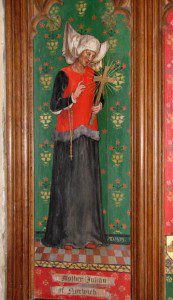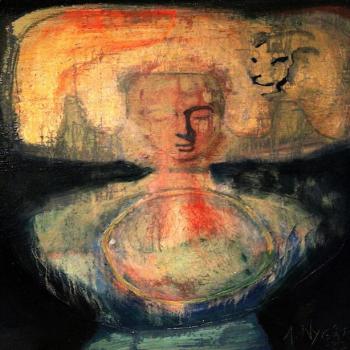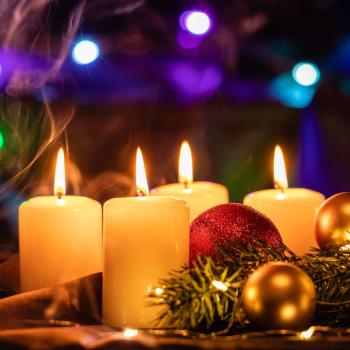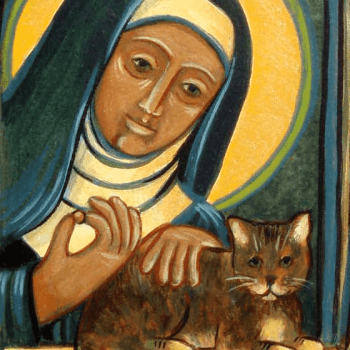
At some point in time, how many of us haven’t wondered if God really exists? We may have even echoed the voices of those who have asked God to show us a sign, any sign, that he or she is real—that our prayers aren’t going out into an empty void, that our faith isn’t a sign of some deeply ingrained ignorance.
Yet, history shows that there are those who have made this connection to a greater force, who claim to have not only sensed the presence of God, but who have felt the Divine within themselves, permeating their entire being. They are often labeled mystics and they have been around since the advent of religion.
Mysticism is defined as the knowledge of God that comes from a direct experience of God. So this knowledge is not learned from years of study or by following a specific religious protocol. It is an experience that is felt deeply and convincingly within, sometimes unexpectedly, a vision of something that is far outside the normal experiences of life.
I recently came across a now out-of-print book titled Mysticism, A Study and an Anthology by F.C. Happold, who points out that mystical experiences are common to all religions and that what stands out is not so much the differences in these experiences but their similarities.
In a prologue titled The Timeless Moment, Happold writes of several modern-day mystics he has studied and how through these supernatural experiences the mystic finds “an illumination and certainty which can rarely, if ever, be reached by the rational consciousness.” Two common themes emerge:
- 1. A discovery of the unity of all things, or what Happold calls “a consciousness of the oneness of everything, a vision of the One in the All and the All in the One.” It is evidenced by the testimony here: A great peace came over me, I was conscious of a lovely, unexplainable pattern in the whole texture of things, a pattern of which everyone and everything was a part; and weaving the pattern was a Power; and that Power was what we faintly call Love.
- The realization that the God we are looking for, and call out to in our times of need, is found within us. Here’s another testimonial via Happold: The room was filled by a Presence, which in a strange way was both about me and within me, like light or warmth. I was overwhelmingly possessed by someone who was not myself, and yet I felt I was more myself than I had ever been before…overall was a deep sense of peace and security and certainty.
The great bulk of Happold’s tome is devoted to the Christian mystics. He highlights over a dozen, spanning both several centuries and several countries. And what again stands out are the similarities of these experiences. I have cherry-picked a few of my favorite writers and passages below:
The French abbot St. Bernard of Clairvaux: My curiosity took me to my lowest depth to look for Him, nevertheless, He was found still deeper…he had passed into my inmost parts. Only by the movement of my heart did I recognize his presence.
The philosopher Meister Eckhart (referring to the soul as the feminine “she”): She plunges into the bottomless well of the divine nature and becomes so one with God that she herself would say that she is God…where God is, there is the soul and where the soul is, there is God.
The reclusive nun Julian of Norwich: God is nearer to us than our own Soul; for He is (the) Ground in whom our Soul stands…Our Soul is kindly rooted in God in endless love.
The former-parish priest John of Ruysbroeck: Grace flows from within, and not from without; for God is more inward to us than we are to ourselves. God works in us from within outwards…not from without.
All these different mystics, separated by time and place, in the days before religious texts were widely circulated, come to conclusions that sound surprisingly alike: We are made in the image of God and when we go looking for God, we find what we seek within. It is a stirring call to arms for all of us who seek God in our daily lives—the realization that we should pause each day to locate and engage with the Divine within.
I’ll close with one more passage, from the English priest William Law and a book he wrote in the 1700s titled The Spirit of Prayer. Law believed in what he calls an “indwelling presence” and that heaven is “as near to our souls as this world is to our bodies.” What follows are his lightly edited words (replacing Law’s “thys”, “thous” and “wilts” with modern-day language):
You see, hear and feel nothing of God, because you seek Him outside yourself. You look for Him in books, in the church and outward exercises, but you will not find him until you have found him in your heart. God is already within you, living, stirring, calling, knocking at the door. Look for him in your heart and you will never search in vain, for he lives there.












